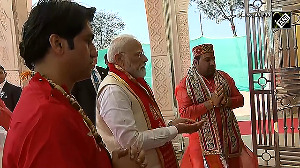Shahid Afridi and Younis Khan blazed away in Pakistan's second innings to set India an improbable target of 383 to win on the fourth day of the third and final Test at the M Chinnaswamy stadium in Bangalore, on Sunday.
Afridi hit the fastest Test half-century for Pakistan, and Younis Khan followed up his first innings's double century with an attacking knock of 84.
Afridi led the way for Pakistan hitting eight boundaries and two sixes in his 34-ball knock, the fastest half-century by a Pakistani in Test cricket, as the visitors declared on 261 for two in their second innings after bowling out India for 449.
Indian openers Virender Sehwag and Gautam Gambhir safely played out the six overs to reach 25 for no loss at the close.
Earlier, V V S Laxman scored an unbeaten 79 in the morning session to take India to 449 all out. He was involved in a crucial 53-run stand for the 10th wicket with Anil Kumble, who made 22.
Leg-spinner Danish Kaneria took 5 for 127, his second five-wicket haul in the series.
Morning session
The outcome of the Test depends on how quickly the Pakistanis can dismiss the remaining Indian batsmen.
As of now, three results are possible: Pakistan can win (that seems the most obvious result), the game can meander into a draw, and there is a very, very faint chance of India winning.
Within 10 overs in the morning session the scenario changed heavily in favour of Pakistan. India lost three wickets in quick time to slide from 379 for 6 to 396 for 9.
Irfan Pathan was beaten by clever change of pace from Mohammad Sami. The first ball of the 105th over was at 87.7, the second ball, the one that foxed Pathan (5), was just 79.3 -- a huge step down in pace and that forced the error. (386 for 7)
Harbhajan (1) then went for a typically wild sweep off Danish Kaneria and top-edged the ball to Abdul Razzaq. (388 for 8)
Next man Balaji was unlucky to be given out. The ball pitched wide outside the off-stump and turned away; Balaji swung across the line and got beaten. A loud appeal for caught behind was upheld by umpire Bowden. Balaji walked away shaking his head. Replays later showed that the batsman did not get a nick. (396 for 9)
At this point, India were in big, big trouble. Pakistan were still ahead by 174 runs and with almost six sessions of play to go, India would be hard-pressed to save the Test.
But Laxman was still there at the wicket. During the first hour of the session, Laxman scored only five runs. He had been troubled by Kaneria, unable to read the leg-spinner's many variations.
But Anil Kumble stood firm at one end and Laxman started to gain in confidence after a while. At this point though he needed to take most of the strike but that did not happen. Every once in a while he played a few stunning shots but otherwise he looked rather placid.
Pakistan eventually took the new ball in the 115th over, 34 overs after it was due. Inzamam-ul Haq must have hoped that this would get him the coveted last wicket. But that didn't happen even though there were some really close shaves.
In the 116th over, Kamran Akmal dropped a straightforward caught behind chance off Razzaq to give Kumble, then on 6, a life. A few overs later, Laxman survived a leg before appeal.
But the batsmen survived and grew in confidence.
At lunch, India had scored 446 for 9. The partnership was already worth 50. Only 25 overs were bowled in the session as Pakistan looked to preserve their bowlers.
Post-Lunch session
India's innings was quickly wrapped up after lunch. Younis Khan, deputing for Inzamam, who was off the field, played the master move by getting Shahid Afridi into the attack. Just four balls into his spell, he produced a quicker one that rearranged Kumble's castle and ended the Indians innings on 449.
VVS Laxman was stranded on 79, off 183 balls, inclusive of 11 boundaries, and one felt that he should have farmed the strike more. Kumble can stick around but the need of the hour was to stay at the wicket for as long as possible. And Laxman's strategy to rotate the strike was flawed to that end.
He was struggling but he needed to put his hand up and take as much strike as possible.
Pakistan were ahead by 121 runs. They would now be looking to get at least 350 on board before letting India have a bat once again. The wicket was now starting to really come into play and batting against the spinners would not be easy.
Pakistan innings
The key man for Pakistan was Shahid Afridi. Like Sehwag, the right-hander has the ability to change the complexion of the match in a few overs.
In Kolkata, during his run-a-ball 59, he gave us but a glimpse of his destructive potential. Today, he attacked like there was no tomorrow. For Pakistan, there was indeed, no tomorrow.
They will be looking to get as many runs as possible and ideally put India in to bat with around 10 overs remaining in the day's play.
The first 50 runs came off just 42 balls. Pakistan were motoring along with the help of edges and well-struck boundaries. Afridi, in particular, was looking deadly; he reached his fifty in 26 balls -- the fastest ever by a Pakistani, beating Yousuf Youhana's 27-ball effort against South Africa at Cape Town in 2003.
Balaji (18 runs off 11 balls) and Irfan (26 runs off 9 balls) were hammered out of the attack by Afridi. Ganguly tunred to his spinners in the seventh over. Kumble replaced Balaji in the attack. Ganguly made one mistake by going completely on the defensive here. Afridi is the kind of player who will give a chance once in the while and you need close-in fielders to hold on to those chances. Ganguly instead opted to stick with one slip and have all the other fielders deep.
After 10 overs, Pakistan were 77 for no loss and things were looking increasingly grim for India. Ganguly had by now effected the second change in the bowling attack by introducing Sachin Tendulkar.
Immediately after the drinks break. Afridi smashed one high and wide towards square leg where Pathan failed to hold on and helped the ball over the boundary line to enable the right-hander move to 58. That was Afridi's last scoring shot of the match as Tendulkar, getting vicious turn from round the wicket, got Afridi swinging and missing. Karthik had an easy stumping and he made no mistake. (91 for 1)
Afridi scored 58 off 34 balls with 8 fours and 2 sixes. He did what he was supposed to -- fire Pakistan towards a potentially match-winning lead on the second innings in rapid time and setting it up for his mates.
Younis Khan came in next and things perciptably slowed down. The second fifty of the Pakistan innings came off 69 balls. This after the first 41 runs had come in 34 balls. It means that to score 9 runs, Younis and Hameed needed 35 balls.
With Afridi back in the pavilion, Ganguly and the Indian team breathed a little easy but Pakistan are still in the drivers seat. Tendulkar was brilliant, having bowled six overs for just 13 runs and claiming the wicket of Afridi.
At the break, Pakistan were 112 for 1 after 22 overs with Yasir Hameed on 36 and Younis Khan on 12.
Post-Tea session:
The Pakistan innings slowed down in the third session with India opting for negative tactics, and both Kumble and Tendulkar bowling round the wicket on the wide expanse of rough patches outside the right-hander's leg stump.
Pakistan reached 150 for 1 in the 33rd over as the run-rate started taking a downward slide.
The first 50 of the innings took just 42 balls, but the next two were comparatively slower, taking 69 and 88 balls respectively.
Yasir Hameed has been overlooked for the one-day international series, but that did not seem to affect the right-hander, who played a determined innings and kept the scoring going at a fair rate even after the dismissal of Afridi.
He reached his seventh half-century in Test cricket from 110 balls, with five boundaries.
Both Younis Khan and Hameed kept picking the singles with some sharp running between the wickets and the occasional boundary, forcing the Indians to change their tactics.
And the first time Kumble went over the wicket -- in his 15th over -- he struck with his second ball of the over. Hameed, who scored 76, was trapped leg before to a straighter one from Kumble, which zipped through.
He put on 92 runs for the second wicket with Younis in 154 balls, before he became Kumble's first wicket of the match. (183-2, 38.2)
Captain Inzamam-ul Haq got into the scheme of things right from the outset, hitting some powerful shots on both sides of the wicket.
Ganguly seemed content with just preventing the flow of runs, and it came as no surprise as he opted for Tendulkar and Kumble to share the majority of the bowling workload.
Younis, who had scored a career-best 267 in the first innings, continued to pile on the runs and reached his half-century in 68 balls, with six boundaries in the 42nd over.
The two batsmen propped the scoring as they put on 50 runs for the third wicket in 45 balls with a mixture of delicate and powerful strokes.
The shot of the day probably could be the left-handed slog over midwicket by Younis Khan off Kumble. The Pakistan vice-captain batting on 69 quickly changed his stance and grip to a left-handed one as Kumble was about to bowl and then thumped him to the boundary on the leg side.
Younis showed utter disrespect to both Kumble and Harbhajan, employing the sweep and the reverse sweep at will, thereby not only upsetting their rhythm but also psyching them mentally.
Pakistan declared at 261 for 2 in 50 overs, setting India an improbable target of 383 runs, with seven overs on the fourth day and 90 overs on day five, on a spin-friendly wicket.
Younis followed up his first innings' double century with another vital knock of 84 from 98 balls, with 10 boundaries. Inzamam chipped in with a quickfire 31 from 32 balls.
All the Indian bowlers were subject to some rough treatment from the attacking Pakistan batsmen on the look out for some quick runs. Kumble (1 for 88) and Tendulkar (1 for 62) were the two successful bowlers.
Indian innings:
A target of 383 is always a daunting task, even with the likes of Sehwag in your batting line-up.
The pitch has its shares of rough patches, but generally it is still good for batting, and it has been shown in the four days in the match that if a batsman applies himself, then getting him out can be a difficult task.
The likes of Younis, Sehwag and Inzamam have showed that once you get set on the pitch, runs come at a fair canter, and a huge score is not out of sight.
The Indian openers seemed content to safely negotiate the six overs bowled in the fading light, to reach 25 for 0.
At close, Gautam Gambhir was unbeaten on 19 and Sehwag on 6.
India need another 358 runs on the final day to win the match. Pakistan will be looking at a couple of early of wickets in the first hour of play, while India's main task will be to ensure that the openers bat out the first session.







 © 2025
© 2025